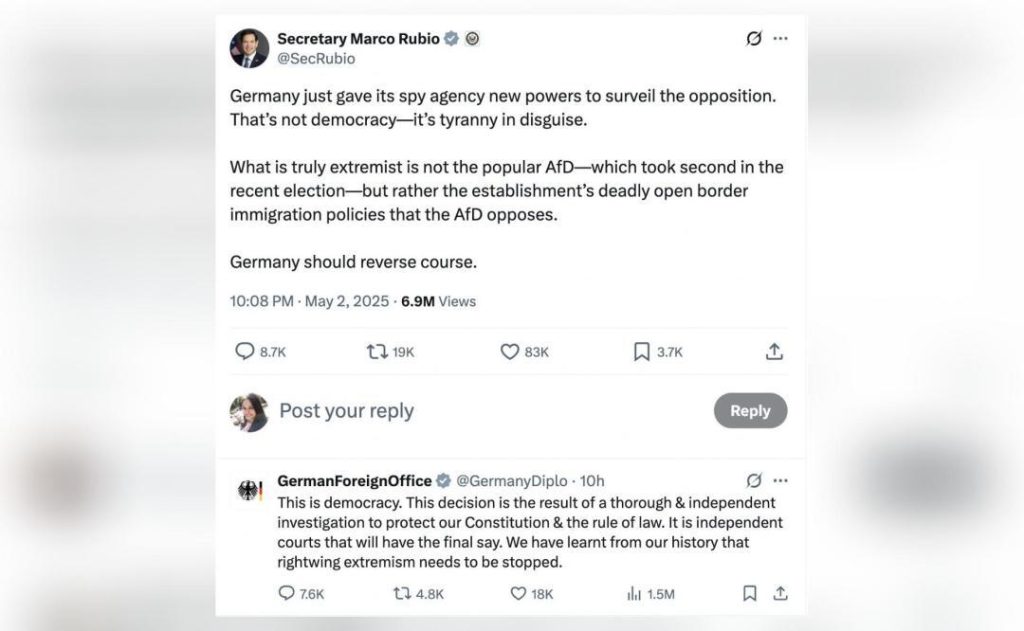
US’ Rubio & German Govt Clash Over AfD Party’s ‘Extremist’ Tag
The world is witnessing a growing divide in the global political landscape, with differing opinions on the definition of extremism and its implications. The latest clash between US Secretary of State Marco Rubio and the German Foreign Ministry is a stark reminder of these differences. The controversy revolves around the far-right Alternative for Germany (AfD) party, which has been labelled as “extremist” by Germany’s spy agency.
The dust was kicked up when Rubio accused Germany of enabling “tyranny in disguise” by designating the AfD party as extremist. This move, according to Rubio, was a form of political repression and an attack on democratic values. The German government, however, maintained that the decision was the result of a thorough investigation aimed at protecting the country’s Constitution.
The AfD party, which was founded in 2013, has been gaining popularity in Germany, particularly among right-wing voters. The party’s platform is built on anti-immigrant and anti-EU sentiments, which has led to concerns among many that it promotes xenophobia and extremism. The German government’s decision to label the party as extremist is seen as a step towards curbing its growing influence.
Rubio’s remarks sparked a heated debate, with many on both sides of the Atlantic weighing in on the issue. The US Secretary of State’s comments were seen as a veiled attack on Germany’s political system, with some accusing him of undermining the country’s democratic institutions. The German government, on the other hand, stood firm on its decision, insisting that it was a necessary step to protect the country’s Constitution and democratic values.
The controversy has sparked a larger debate on the definition of extremism and its implications on democracy. While some argue that the term “extremist” is often misused and can be subjective, others believe that it is essential to label and condemn extremist ideologies that threaten democratic values.
The German government’s decision to label the AfD party as extremist is seen as a crucial step in this direction. The party’s anti-immigrant and anti-EU sentiments have been criticized as xenophobic and discriminatory, and the government’s move is seen as a way to curb its growing influence.
However, Rubio’s remarks have also raised concerns about the erosion of democratic values and the potential for political repression. The US Secretary of State’s comments were seen as a warning to Germany about the dangers of political repression and the importance of upholding democratic values.
The controversy has also highlighted the challenges faced by democratic societies in dealing with extremist ideologies. In an era where social media has given a platform to extremist voices, it is essential for governments to develop effective strategies to counter these ideologies and promote democratic values.
The German government’s decision to label the AfD party as extremist is seen as a step in this direction. The party’s anti-immigrant and anti-EU sentiments have been criticized as xenophobic and discriminatory, and the government’s move is seen as a way to curb its growing influence.
The controversy has also raised questions about the role of intelligence agencies in identifying and combating extremist ideologies. Germany’s spy agency, the BfV, has been accused of being too lenient in its handling of the AfD party, which has led to concerns about its ability to effectively combat extremism.
The BfV’s decision to label the AfD party as extremist was seen as a significant step in this direction. The agency’s report accused the party of promoting xenophobic and anti-Semitic sentiments, and warned that it posed a threat to Germany’s democratic system.
The controversy has also highlighted the importance of international cooperation in combating extremism. The US and Germany have a long history of working together on issues related to terrorism and extremism, and the controversy has raised questions about the effectiveness of this cooperation.
In conclusion, the clash between US Secretary of State Marco Rubio and the German Foreign Ministry over the AfD party’s “extremist” tag is a complex issue that raises important questions about the definition of extremism and its implications on democracy. While the German government’s decision to label the party as extremist is seen as a crucial step in combating extremism, Rubio’s remarks have also raised concerns about the erosion of democratic values and the potential for political repression.
As the world grapples with the challenges posed by extremist ideologies, it is essential for governments to develop effective strategies to counter these ideologies and promote democratic values. The controversy has highlighted the importance of international cooperation and the need for governments to work together to combat extremism.



